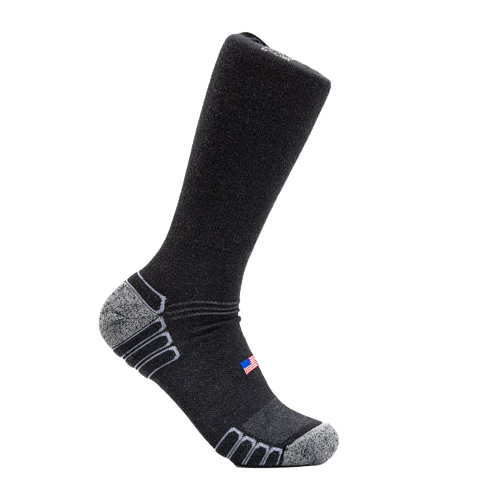After wearing both steel-toe and soft-toe boots for over 25 years, I’ve found that choosing the right one for the job makes my life a whole lot easier.
My safety and comfort are my primary concern, and there’s a time when a pair of iron-clad steel-toe boots are a must. For the office or home, it has to be my soft-toe boots—they’re much more flexible and comfortable and look sleeker than my safety boots.
In this post, you’ll learn the pros and cons of working in each type of boot so you’ll know which one to go for to make your work day safer and more comfortable.
Steel Toe vs. Soft Toe Boots: An Overview
Before we go into the pros and cons of each type of boot, it’s worth looking at each type’s main characteristics. Soft-toe isn’t another term for composite, so if you’re buying boots for additional safety while at work, it’s essential to know that a pair of soft-toe boots won’t help.
The Ariat Rebar Wedge Moc Toe work boot is a great-looking work boot with a thick, cushioned sole and a lightweight stabilizing shank. The Rebar is a comfortable, durable boot, but as a soft-toe variety, if you drop anything heavy on your foot, you’ll know about it.
Like the Ariat Rebar, the Carolina Elm 8” Met Guard work boot is waterproof and oil and slip-resistant, but thanks to its steel toe, the Elm offers much greater workplace protection. Both the Ariat and the Carolina are work boots, but there’s a clear difference in the sort of environment they should be worn in.
Steel-toe For Safety
Once you’ve worked in an environment where steel-toe boots are required, it’s hard to switch to a soft-toe boot. Steel-toe boots protect your feet from unforeseen accidents on anything from construction jobs to warehouse or farming jobs.
If you prefer a specific boot shape, having a steel toe doesn’t restrict your choice of purchase either; you can find cowboy boots, Chelsea boots, Moc toe, and even Wellington boots that come with the additional safety that a steel toe offers.
A favorite of mine is the Wolverine Steel Toe Insulated Wellington. I do a lot of work out in the mud when I’m not at my desk, and these boots keep me warm and dry and can handle anything I drop on my feet.
I’ve dug out old trees in the Wolverine Wellington and done the manly thing when I can’t get the stump out and tried kicking it out instead. It didn’t work, but my toes were none the worse for wear.
Soft-toe For Comfort
Around the office or for jobs that don’t involve heavy lifting, stomping around in heavy steel-toe boots can be a bit extreme. A bit of light gardening won’t need the added protection that steel-toe boots bring, whereas digging probably will.
There’s many a man out there with three holes in their foot where the gardening fork went right through their sneakers. Don’t become that guy, dear reader.
The Ariat Groundbreaker Chelsea Wide Square Toe work boot is an excellent example of a multi-functional, soft-toe work boot. They’re incredibly comfortable, easy to pull on and off, and look fantastic. My plumber has a pair of these boots, as he often heads in and out of houses to his truck, then heads back into properties.
The Ariat Groundbreaker is ideal for quickly slipping in and out of, and they’ll still offer decent protection and incredible comfort when on your feet all day. The lack of a steel-toe cap also means that bending down is more manageable; a considerable bonus to soft-toe boots is the flexibility of the sole and toe cap.
Now you’ve got a feel for each type of toe, let’s look at the pros and cons of each. Matching your profession and the needs of your day-to-day life is much easier when you know what benefits each kind of toe has.
If you’re a steelworker and see many more cons than pros when trying to decide if soft-toe boots are for you, then perhaps you’ve had your question answered. Match your boot to the environment or job, and your feet will stay safe.
Pros and Cons of Steel-Toe Boots
Steel-toe boots are the ultimate safety boot. They’ve been around since the Second World War and are a must for any job with a risk of injury. Most employers won’t even let you onto some sites without the correct PPE (Personal Protection Equipment), so it’s worth asking the question.
Pros
- The steel toe cap protects your toes.
- Steel-toe boots often come with a steel shank in the sole for added protection.
- Employers often require them when on-site.
- Well-made steel-toe boots often last a lot longer than alternatives.
- Available everywhere and usually at affordable prices.
- Can be used in almost any industry.
Cons
- The steel toe cap can become incredibly cold in cold weather, making your feet feel like blocks of ice. The steel toe can get hot to the touch in scorching weather, so composite or soft-toe boots would be an ideal solution.
- Noticeably heavier than soft-toe—you’ll feel it after a long day on your feet.
- If you buy the wrong size, the steel toe cap can be restrictive and painful for your toes.
- Steel-toe boots aren’t flexible, so they can make your feet ache if you’re on uneven terrain.
- The metal in the boots makes them highly unsuitable for wearing around security measures such as airport metal detectors.
- Not ideal for use around electrical currents; the steel toe and shank offer poor protection. Electricians or those who work around high voltages should wear composite or soft-toe boots.
A lack of flexibility can lead to foot problems and long-term back issues due to causing poor posture. For more information on the negative aspects of steel toe boots, read our guide on Can Steel Toe Boots Cause Foot Problems? 4 Common Issues.
Pros and Cons of Soft-Toe Boots
Soft-toe boots are ideal for certain professions and have the added benefit of being wearable for casual wear. In a fast-paced, busy warehouse, where there may be heavy machinery or goods, you need protection for your feet that only steel-toe boots can supply. There are, however, many jobs where soft-toe boots aren’t just preferable—they’re ideal.
Where minimal protection is required, and you’re up and down all day, kneeling down, or working with electricity, soft-toe boots are perfect. The lack of a steel toe cap means the boot flexes much better, allowing you more freedom of movement. In freezing or red-hot weather, the less steel surrounding your toes, the better.
I worked outdoors for an entire winter as a student, wearing steel-toe boots because they were the only boots I owned, and I’d never been as cold in my life. I didn’t need the protection and didn’t need a metal cup quietly giving me frostbite for eight hours a day. It’s a case of the right tool for the job, and sometimes soft-toe boots are a perfect choice.
Pros
- Soft-toe boots are much more comfortable than steel-toe boots.
- If you’re after flexibility, then soft-toe is the way to go.
- The lack of metal reduces conductivity, which is ideal for electricians.
- Soft-toe boots suit low-impact professions with minimal risk of injury.
- A smarter-looking boot than most steel-toe boots, they’re great for wearing around the public, where smarter footwear is required.
- A broader selection range is available. Most retailers offer sturdy soft-toe boots.
- Noticeably lighter than steel-toe boots, which are ideal for long periods of walking around.
- Still provide excellent slip resistance, ankle support, and chemical protection.
- They’re easier to repair than steel-toe boots.
Cons
- Soft-toe boots won’t protect you from injury, crushing, dropping heavy things, or puncture wounds to your feet. Choosing your work boots needs careful consideration.
- If you work on sites, there is a chance you’ll need to wear steel-toe boots.
- Higher risk of splitting. They’re more flexible than steel-toe bo.
Conclusion
Choosing the right soft-toe or steel-toe boots is critical, not just for your comfort but also for your safety. Consider your working environment and the weather conditions before you buy. In a work zone with risks, opt for a steel-toe boot like the Ariat Groundbreaker 6” Work Boot because your feet need the added protection that a steel-toe provides.
Soft-toe boots are ideal for working in residential zones rather than commercial or industrial sites. They’re comfortable and flexible, and you get almost all the advantages of a steel-toe boot.
If you’re outdoors with no greater risk than the weather, soft-toe boots stand out as the lack of a metal toe will keep your feet from feeling the cold or heat. The Ariat Groundbreaker Chelsea Wide Square Toe is easy to get on and off and still stands out as a professional-looking work boot.






